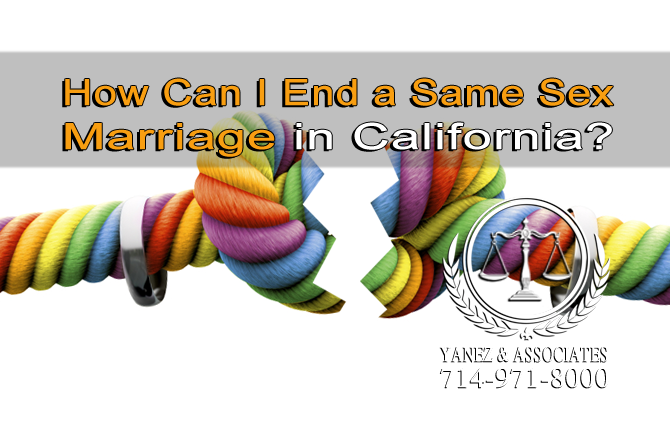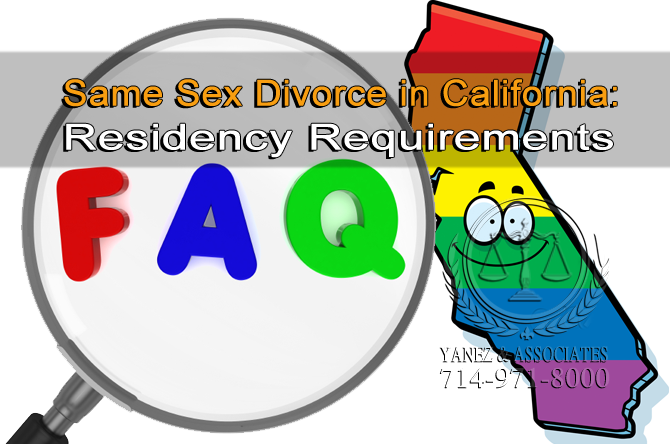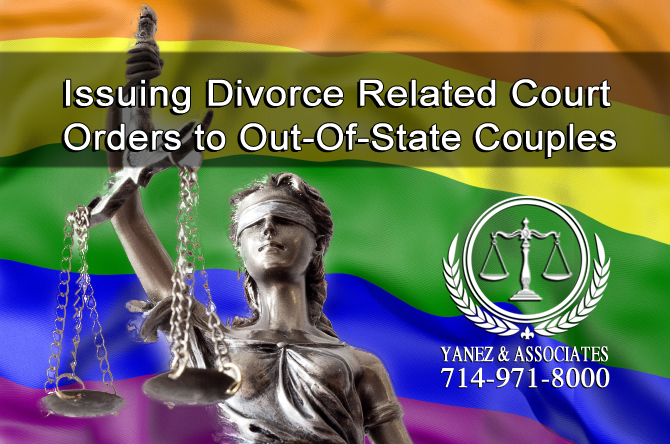Same-Sex Marriage FAQ: Same-Sex Marriage: Orange County CA Same-sex Divorce Attorney
Same Sex Divorce in Orange County, California
California has always been one of the most progressive states in the nation regarding marriage equality. Same sex couples have been allowed to marry in California in the past, unlike many other states. California also recognizes same sex marriages that take place outside of California. However, where marriages take place, divorces are likely to happen too. In order to obtain a same sex divorce, the marriage must be recognized in the first place, and California is one state that does both.
With new laws across the nation regarding same sex marriages, laws regarding divorce are likely to change soon. However, with its progress having started some time ago, California’s same sex divorce laws are already in place and have several years of practice behind them.
Divorcing in any state will have certain effects on the outcome of a divorce, especially depending on where you live at the time of your divorce. Laws for same sex divorces and laws for heterosexual divorces vary slightly, and with recent national developments, these laws could be changing further in the near future. It is always best to contact a divorce attorney so that you can understand what the current laws are and how they might affect your divorce. In California, you should be able to find a family attorney who has experience with both same sex divorces and heterosexual couples.
How Can I End a Same Sex Marriage in California?
The first thing to remember about your same sex marriage is that there are several ways that you can end it in California: divorce, a legal separation, and an annulment.
A divorce is the only way to legally recognize that your marriage existed, and to end it. With a divorce, you can ask the court for orders regarding things like child custody, child support, spousal support, and the division of property. There are certain requirements for obtaining a divorce in California.
A legal separation, on the other hand, allows you to remain legally married while still dividing property and debt, and obtaining court orders regarding child custody, child support and spousal support. The requirements for obtaining a legal separation are not as strict as they are for getting a divorce.
An annulment is a way to erase a marriage that never should have been legal in the first place. This might be because one party was already married, because one party was forced into the marriage, because one party was not of sound mind at the time of the marriage, because either party could not consummate the marriage, or because either party was not old enough or did not have consent to enter a marriage.
Same Sex Divorce in California: Residency Requirements
First of all, California does recognize same sex marriages, and it does issue same sex divorces. However, there are certain requirements that all married couples may need to meet in order to get a divorce in California.
So, what are the requirements for a same sex divorce?
The first requirement for all divorces in the state of California is a minimum six-month waiting period between the filing of the first paperwork and the divorce being finalized. There is no way around this; California law requires that all divorces take at least six months. Whether you use this time to come to an agreement regarding your divorce orders, or your orders are created quickly and this time is just used for waiting, you will need to wait six months.
Married couples of the same sex in California who are looking for a divorce and registered domestic partners of the same sex in California who are looking for a divorce have slightly different requirements.
Married couples in California who wish to obtain a divorce need to meet the general residency requirements for divorce in the state of California.
• One partner needs to have lived in California for at least the last six months, and
• One partner needs to have lived in the county where the divorce will be filed for at least the last three months.
Married couples of the same sex who were married in California, but who do not currently live in California can file for a divorce in California if they live in a state that will not issue a divorce to a same sex couple without meeting any residency requirements. These couples will need to file for the divorce in the same county in which they were married. Recent changes to federal law may alter this law, so it is always a good idea to work with an attorney so that you understand how it works for you.
Those who are in a registered domestic partnership may also divorce in California without meeting residency requirements as long as they have registered their domestic partnership in California.
If the domestic partnership was not registered in California, one of the partners must have lived in California for at least the last six months, and in the county where the divorce will be filed for at least the last three months.
In some cases, couples may wish to dissolve both a registered domestic partnership and a same sex marriage at the same time. In order to do so, the couple needs to meet all of the residency requirements at once.
Keep in mind that if you and/or your spouse do not meet the residency requirements for a divorce, you may be able to meet the requirements for a legal separation, obtain court orders regarding things like property division, child support and spousal support, and file for a divorce at a later date.
Issuing Divorce Related Court Orders to Out-Of-State Couples
Although California does recognize same sex marriages that did not take place in California, there still may be challenges if neither party currently resides in California, they may face difficulties when it comes to issuing court orders relating to things like child custody and property division.
California law is designed to issue court orders regarding property that was acquired in the state of California, but even heterosexual couples who have lived outside of California for any portion of their marriage may face difficulties when it comes to dividing property that was acquired out of state and then brought back to California. This is called quasi-community property, and is generally treated as community property. However, when neither party lives in California and all property is divided according to California’s community property laws, a property division order may not be as easy to enforce upon returning to the couple’s home state.
How Do I Get a Divorce in California?
The process for obtaining a same sex divorce in California is the same as the process for obtaining a heterosexual divorce - the main difference between the two lies in the eligibility and residency requirements.
California divorces are legal processes, which require that paperwork be filed with the court and served on the other party. It means that agreements will need to be made regarding issues between the couple so that they can both move forward with their lives. Making these agreements can be one of the most time consuming and stressful parts of the divorce, and it is advised that every person going through a divorce consults a lawyer before signing any paperwork or making any final decisions.
Usually, in a divorce, the divorcing couple will ask the judge for court orders regarding things like child custody, visitation, child support, property division, debt division, asset division, and spousal support. Depending on your unique situation, you may or may not need all of these orders.
Keep in mind that a collaborative divorce or divorce mediation are two alternatives to leaving your divorce agreement up to the judge’s discretion. Regardless of sexual orientation, it is generally recommended that in a divorce, the two parties at least attempt to work through their issues outside of the courtroom before going to trial.
Divorce mediation allows both parties to work together with the help of a third party mediator to create a plan and come to an agreement regarding their divorce. For example, a couple that has minor children would need to include plans regarding child custody, visitation, and child support. Couples who do not earn similar amounts on their own may need to consider child support. A divorce mediator is a neutral party whose job it is to facilitate a healthy and productive conversation between the two parties so that a divorce agreement can be reached.
Collaborative divorce is another option for creating a divorce agreement outside of the courtroom. In a collaborative divorce, both parties hire separate attorneys and work together with those attorneys and with each other to create a divorce plan that works best for both parties. Instead of working against one another, which is often what happens in court, collaborative lawyers are trained to work with each other so that both parties can come to a resolution.
Same Sex Divorce Lawyer in California
Due to recent changes in federal law, same sex divorce law is likely to change quickly. California has laws in place that have recognized same sex marriages and successfully dissolved them in the past. It is always recommended to work with a divorce attorney in any divorce. Contact the family law lawyers at Yanez & Associates today to schedule your free initial consultation.
















